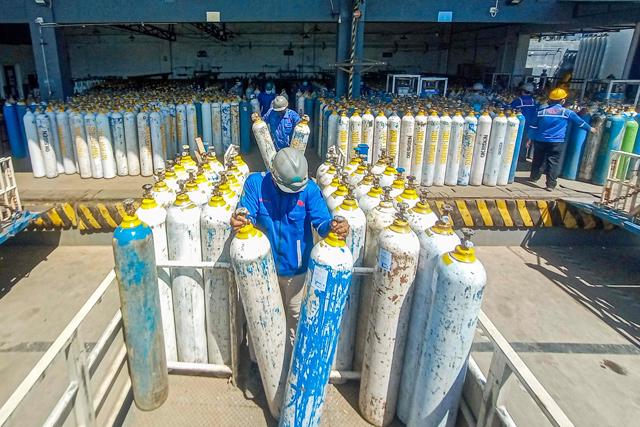- International News
- Web-2021-07-07 | 02:16 pm

Nayrouz News Agency :
Indonesia said on Tuesday it was importing emergency oxygen from neighbouring Singapore as hospitals crumbled under the weight of COVID-19, with the Delta variant continuing to wreak havoc around the globe.
Faced with the threat of the highly infectious strain which continues to exact a heavy toll in human tragedies and to disrupt sports events worldwide, the global vaccination drive is heating up.
On Tuesday, the United States began sending Vietnam 2 million doses, part of a first batch of 80 million doses that US President Joe Biden has pledged to allocate to countries struggling to tame the pandemic.
Vaccines are seen as the main hope of breaking a cycle of economy-busting lockdowns in a pandemic that has killed close to four million people, according to an AFP compilation of official data.
But concerns have emerged that jabs initially seen as providing high protection against the virus may not be so effective against the Delta strain.
Vaccinated medical workers dead
In Indonesia, a nightmarish COVID-19 wave has brought hospitals to their knees, with desperate families hunting for oxygen tanks to treat the sick and dying at home.
Nearly 1,000 Indonesian medical workers have died of COVID-19, including more than a dozen who were already fully inoculated.
On Tuesday, Jakarta said about 10,000 concentrators — devices that generate oxygen — were to be shipped from nearby Singapore with some arriving by a Hercules cargo plane earlier.
The government was also in talks with other countries, including China, for help it said.
Senior minister Luhut Binsar Pandjaitan said the country was bracing "for a scenario of up to 50,000 cases a day, maybe even 60,000 to 70,000 per day at worst".
"But we hope that won't happen."
Russia is also battling a surge in cases, reporting a new national record of 737 deaths over the past 24 hours.
And Spain’s Catalonia region is reimposing virus restrictions such as closing nightclubs to try and tame a spike in infections, particularly among unvaccinated young people.
100,000 daily UK cases?
Britain too is seeing a spike in new cases, warning that infections could more than treble to 100,000 a day.
It has nevertheless announced it will drop most of its virus restrictions.
From July 19, people will no longer need to wear masks or maintain social distance indoors, and from mid-August, those who have received both doses of the vaccine won’t need to self-isolate if they come into contact with a positive case.
The Delta variant now accounts for nearly all new COVID-19 cases in Britain, but mass vaccinations have stopped a resultant surge in hospital admissions or deaths.
London is preparing to host the Euro 2020 football semi-finals and final this week, with 60,000 fans allowed in at Wembley stadium, two-thirds of its capacity.
German Chancellor Angela Merkel last week told her British counterpart Boris Johnson that he was risking too much by permitting so many fans.
Highlighting fears over the variant, England was forced to name an entirely new cricket squad on Tuesday for their one-day international series against Pakistan, after a coronavirus outbreak in the English camp.
Meanwhile Australia’s Formula One Grand Prix and MotoGP races were called off Tuesday for a second year in a row due to entry restrictions and logistical problems caused by the pandemic, officials said.
Other major sporting events are also feeling the pinch, and none so much as organisers of the Tokyo Olympics, who are desperate to contain the virus when the Games kick off later this month.
On Tuesday, organisers said fans would be urged not to line the route of the marathon over fears that crowds could spread COVID-19.
Games president Seiko Hashimoto recently warned that a closed-door Olympics remained an option if infections got out of hand.













